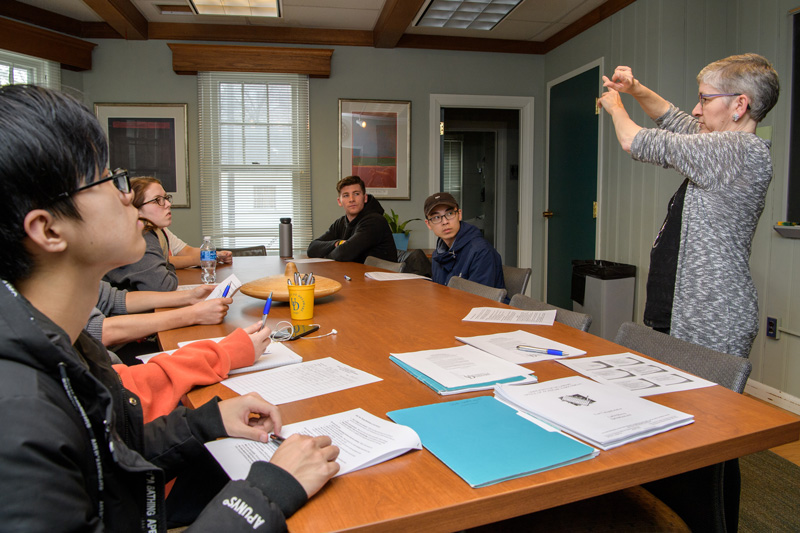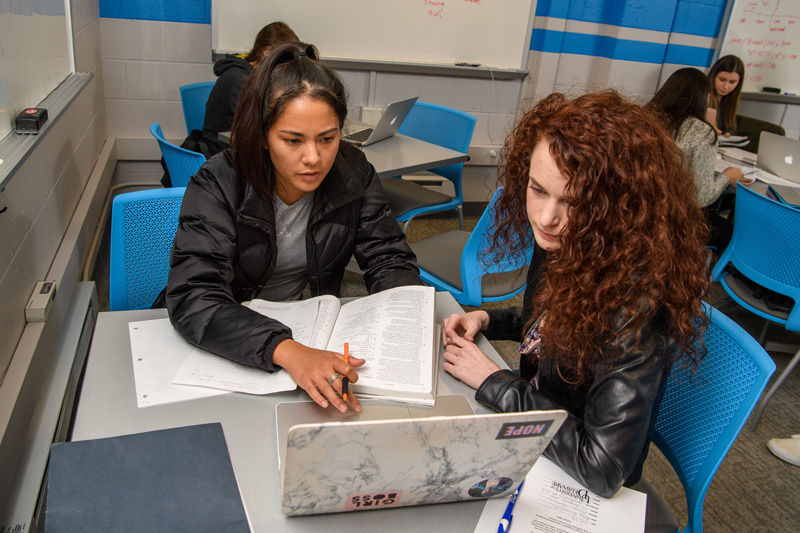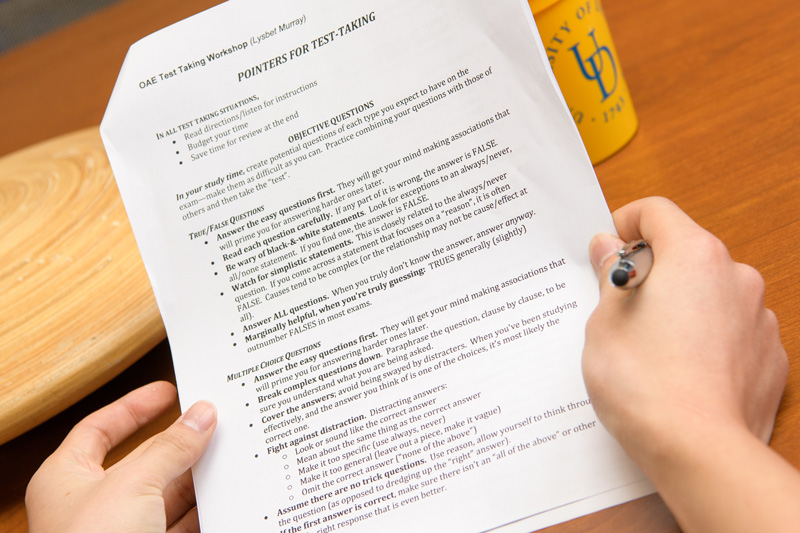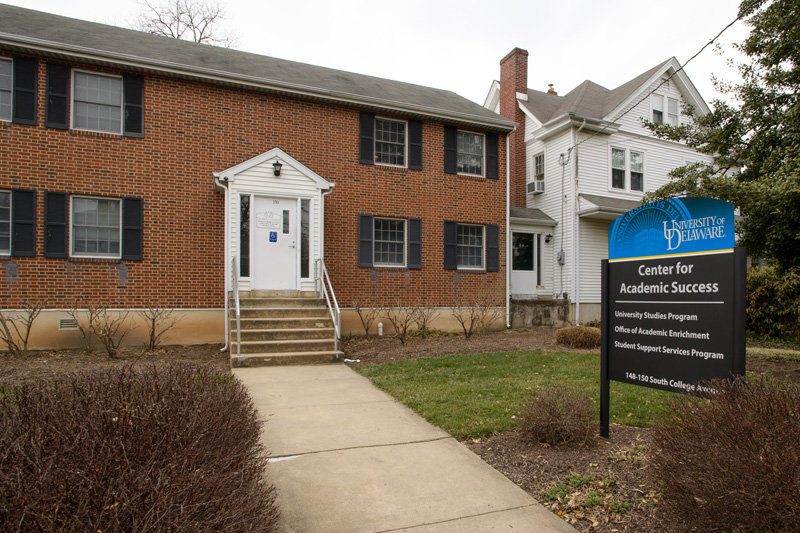


Study strategies for final exams
Photos by Kathy F. Atkinson May 13, 2019
UD’s Office of Academic Enrichment offers advice
Final exams are right around the corner for University of Delaware students. While focusing on completing classes and final projects is important, now is the time for students to begin studying for final exams as well.
Lysbet Murray, assistant director at UD’s Office of Academic Enrichment, has worked with students over the years to help them create study strategies for success. She said the key is time management. No matter how busy a student’s schedule is, she encourages them to write everything out on a calendar and identify the gaps to squeeze in time to study.
Once you find the time, you want to make the most of it. Murray said one of the biggest mistakes she sees students make when studying, especially first-year students, is trying to memorizing material instead of really learning it.
“Generally, the kinds of questions they get here are much more challenging,” Murray said. “They’re dealing with how and why questions instead of what, which makes it a challenge for a lot of people who just never had to think that way before. Professors are asking for applications of concepts which requires a completely different kind of studying.”
There are many different ways to manage studying. Below are three of Murray’s recommendations for how to approaching studying for finals.

Reformatting
For all of these strategies, the goal is to move what you’re learning from short to long-term memory. To achieve this, you want to ideally give yourself a couple of weeks so the information can make that transition. Waiting to study a few days prior to an exam is risky, because you will likely need to reteach yourself the concepts and may struggle to remember.
Reformatting means altering the material from the form it was originally presented in. If a professor teaches mainly through a textbook and powerpoint slides, reformat the material into charts, tables, graphs, pictures, diagrams etc. This helps you move away from just memorizing because it challenges you to think of the material in a new way.
Distributed studying
The idea behind this strategy is to change things up. If you have a three hour window to study, you can start out studying math until you tire and then switch to English. Murray recommends limiting your studies of each subject to one hour. Then spend the next hour on a different topic.
This is a useful method of studying because it forces you to continuously return to the material. Each time you return to a subject, pick up where you left off with a short review and then dive into the section or chapter you want to focus on for that session.
“It gives you an opportunity to say, ‘Okay I am in control of this chunk of information,’ ” Murray said. “ ‘This connects with this chunk I’ve done yesterday. This needs to help me build towards my understanding of what’s coming up next week.’ So you need to always put it in context.”
Using the brain in different ways ultimately helps with stamina. There is not necessarily a limit on how much time you should study, but Murray notes to be mindful of when you feel hungry or fatigued and listen to your body when it needs a break. All-nighters don’t usually work for this reason — at some point you become too tired to process any more information. Generally, she recommends studying two to three hours per credit each week.

Quiz yourself
Quizzing yourself encompasses talking through the material and anticipating the questions a professor might ask you on an exam. The point is to test your true understanding of the material. Talk to yourself, a friend or even a pet about a concept and see if you can actually explain it. Tools like creating mnemonic devices, associations, patterns etc. can help. The goal is to paraphrase the material in your own words.
If there are smaller points you are struggling with, using online study tools like Khan Academy for a quick review may help. If further assistance is needed, UD’s Office of Academic Enrichment offers tutoring for all subjects.
Another way to test your knowledge is to literally make an exam and take it. If you know the test will be multiple choice or short answer, make the tests in that format. Using existing quiz making tools like Quizlet can make the process simple.
All three of these strategies encourages a student to engage and interact with the material, which ultimately helps with learning.
Finals aside, building strong study skills and habits is a crucial tool that will serve you well. Research shows people forget roughly 75 percent of what they learned after about a week. The key to beating the forgetting curve is to review your notes regularly, so the material will stay fresh in your mind. Other study practices students should aim to master include truly concentrating and stepping away from all distractions, figuring out your preferred method of studying and don’t be afraid to ask for help.
UD’s Office of Academic Enrichment offers various online workshops focusing on a range of topics including studying strategies, time management and test-taking. Those workshops can be found on the office’s website.
Don’t forget to de-stress
You can do all the studying in the world, but you’ll only be so prepared for an exam. Don’t underestimate the importance of sleeping and eating healthy foods — both incredibly important steps on the path to success.
Also, make time for breaks to de-stress and recharge. Here’s some upcoming stress less events on campus:
May 14: Color Me Calm at 6 p.m. in Trabant Student Center Lounge
May 22: Free Iced Coffee from 11 a.m. to noon and 5:30 to 6:30 p.m. in the Morris Library Information Room
May 23: Free Frozen Treats from 11 a.m. to noon in the Morris Library Information Room
May 23: Stress Less Event, Make your own trail mix at 2 p.m. in Morris Library Information Room
May 23: Paws for a Break, Therapy Dogs from 7 to 8 p.m. in the Morris Library Reference Room
May 24: Board Game Night from 6 to 9 p.m. in the Morris Library Information Room
May 28: Stress Less Event, Snack Fairy Cart at 6 p.m. in Morris Library
If you are feeling overwhelmed by the end of the semester, UD offers resources for students to find someone to talk with. These include appointments with the Center for Counseling and Student Development, the UD Helpline which is available 24/7/365 at 302-831-1001 and the Crisis Text Line for anonymous support by texting UDTEXT to 741741.
About the Office of Academic Enrichment
The mission of the Office of Academic Enrichment (OAE) is to empower students to develop the academic skills and strategies that will pave the way for future success. Every student can benefit from the support offered — struggling students gain confidence and see great improvement, and high-achieving students become even stronger.
The office offers a number of free services for students including group tutoring, drop-in tutoring, supplemental instruction and much more. Whether you are struggling, looking for some guidance, or just want help getting organized for finals do not hesitate to reach out.

Contact Us
Have a UDaily story idea?
Contact us at ocm@udel.edu
Members of the press
Contact us at 302-831-NEWS or visit the Media Relations website

